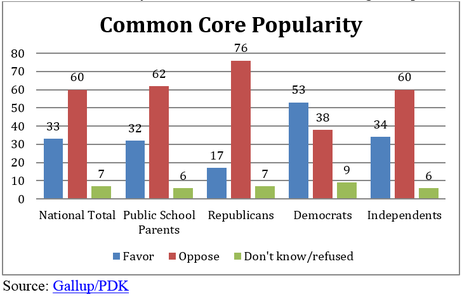The Common Core-aligned exams are computer-based, and we know a key disadvantage of taking a test on the computer is technological glitches. To reduce the likelihood of widespread problems, two testing consortia field-tested their assessments earlier this year before implementation had started. But, in a rush to implement the exams, some test vendors are eschewing field-testing, which could lead to test interruptions and lost answers. In the event of widespread technical problems with the tests, there could be thousands of unique issues in classrooms spread out throughout the country. This could have dramatic consequences if glitches cause errors in data used to evaluate teachers and students. Although several people would be responsible — including the Common Core consortia, test vendors, and test administrators — politically, the Common Core brand would suffer because the standards are the policy change that people would blame. Glitches also present tricky political problems because the only solution is to find a solution.
The Looming Election
Elections require candidates to draw sharp comparisons with their opponents to win undecided voters, and when it comes to the Common Core, many candidates have already decided to campaign in opposition. The most prominent example is Louisiana Gov. Bobby Jindal, who previously supported the Common Core but recently decided to sue the Obama administration. Part of former Majority Leader Eric Cantor’s surprise primary loss has been attributed to his support of the standards. Looking forward to 2016, presidential hopefuls Ted Cruz, Rand Paul, Rick Perry, and Rick Santorum all oppose the Common Core. Even if these anti-Common Core campaigns fail, these candidates will have invested considerable money and political capital into attacking the standards. If enough candidates adopt the same message, the 2014 election could play a major role in sinking the Common Core.
Low Test Scores
By design, the Common Core will likely drive test scores down in the short term. As schools switch to the tougher standards — along with more rigorous exams — teachers and students will struggle. But in a few years, higher expectations will spur educators to do better and test scores will improve. But, if government officials decide to jettison the standards based on an overreaction to the early test score results, the Common Core could be in serious jeopardy.
In an episode of the political television drama The West Wing, an adviser to the president argues, “Conventional wisdom in Washington is like concrete. [Once] it hardens, there's nothing you can do about it.” Political success for the Common Core is still possible because most people don’t have an opinion on the standards. But trials from technical snafus, elections, and plummeting test scores will test the Common Core, and any failure could solidify the narrative that the standards are bad for students.
Josh Bleiberg is a research analyst in the Center for Technology Innovation at the Brookings Institution. Reach him via email or Twitter.


 RSS Feed
RSS Feed